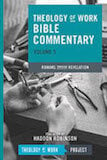All Things New: God’s Bringing Creation to Its Glorious Destiny
Blog / Produced by The High Calling
I grew up in Kingston, Jamaica. In high school, my best subject was art. I loved sketching, painting, sculpting.
But my parents explained that to consider art as a career would be unrealistic; I wouldn’t be able to make a living doing that.
The argument from my church was different. Some pious Christians told me that art wasn’t a “spiritual” pursuit so it wasn’t a worthy vocation. “You’re a young man who loves Jesus,” they said. “Clearly, you should go to seminary.”
So at eighteen I enrolled in the Jamaica Theological Seminary, an undergraduate institution in Kingston.
But on the way to earning a BTh degree, my life was changed.
It started with a theological paradox that affected me existentially.
A Hierarchy of Vocations?
On the one hand, the faith that I learned both from church and seminary was that ordinary matters in the “world” (including the physical and social worlds) were of less importance than “spiritual” matters. So if you really wanted to serve God and be utterly faithful to Christ, you needed to do some form of pastoral work.
But I knew that pastoring was simply not my calling.
By the age of twenty I had discerned that my gifts lay in teaching. I was interested in ideas; I wanted to make sense of the world, including the world of the Bible. And I could communicate what I was learning—to other students who were struggling with course material, in small group discussions and Bible studies, in topical talks at youth group meetings, and in sermons I preached in different churches.
But the pastorate? Absolutely no interest, no sense of calling; and I lacked the relevant gifts, except for teaching.
The result of absorbing this hierarchy of vocations (which was simply in the air) was that I began to feel like a second-class citizen in God’s kingdom in comparison to my fellow students who were planning on the pastorate or some other form of church work.
Creation and Incarnation
Yet, in contrast to this hierarchy, I was discovering the Bible clearly teaches that all people are made in God’s image and commissioned to rule the earth as his representatives (Gen. 1:26-28). And when God finished creating the universe, he looked at all he had made and saw that it was “very good” (Gen. 1:31). There was no hierarchy of better and worse in God’s world.
This realization led me to study the Bible with an eye to understanding its worldview.
It became important to me that the Creator who made the world “very good” had not given up on the world after sin. Instead, God became incarnate in the man Christ Jesus, thus affirming the value of the created order (even the material world)!
And Jesus lived as a Galilean peasant for thirty years. For most of his adult life he was simply an artisan, who worked with his hands—which speaks volumes about the validity of ordinary, earthly life.
I came to realize the sacred/secular distinction was bogus.
The Cosmic Scope of Salvation
But beyond creation and incarnation, there was atonement. I had always known that the blood of Jesus was shed for sinners (and that included me). But then I noticed Colossians 1:20 spoke of God’s intention to reconcile “all things” in heaven and earth to himself through the blood of the cross.
And, I was amazed by the vision of Romans 8:19-21, that the groaning of creation in its bondage to futility is accompanied by its anticipation of sharing in the same glorious liberation that God’s children will enjoy (described in verse 23 as the “redemption of the body”).
During this time I went on a hiking trip to Blue Mountain Peak, the highest point on the island. After a night on the Peak, a group of us got up early to watch a breathtaking sunrise at seven and a half thousand feet. After some minutes of silence, my friend, Junior, commented wistfully, “This is so beautiful; it’s such a shame that it will all be destroyed some day.”
I still remember the dawning awareness: I don’t think it will be. It did not make sense to me that the beauty and wonder of earthly life, which I was coming to embrace joyfully as part of my growing Christian faith, could be disconnected from God’s ultimate purposes of salvation.
By the time I was ready to graduate with my BTh degree, I had become utterly convinced that the Bible consistently teaches that God intends to bring creation to its glorious destiny—a destiny described in the New Testament as “a new heaven and a new earth” (Rev. 21:1; 2 Pet. 3:13).
So I had to cringe inwardly when at my graduation, a wonderful older lady from my church (a true “prayer warrior” grandmother figure) congratulated me on my newly-earned degree and exhorted: “Richard, I don’t want to hear when we get to heaven that you ever worked in a secular job.”
Well, I graciously thanked this loving woman for her prayers and support over the years and gave her a big hug. And then I proceeded to ignore her advice.
Not only was I planning on a “secular” job, but I no longer believed in “heaven” as the final destiny of believers.
Ever since then the Bible’s vision of the renewal of creation has grounded my teaching and research. And I have been personally invigorated by God’s intent to make “all things new.”





